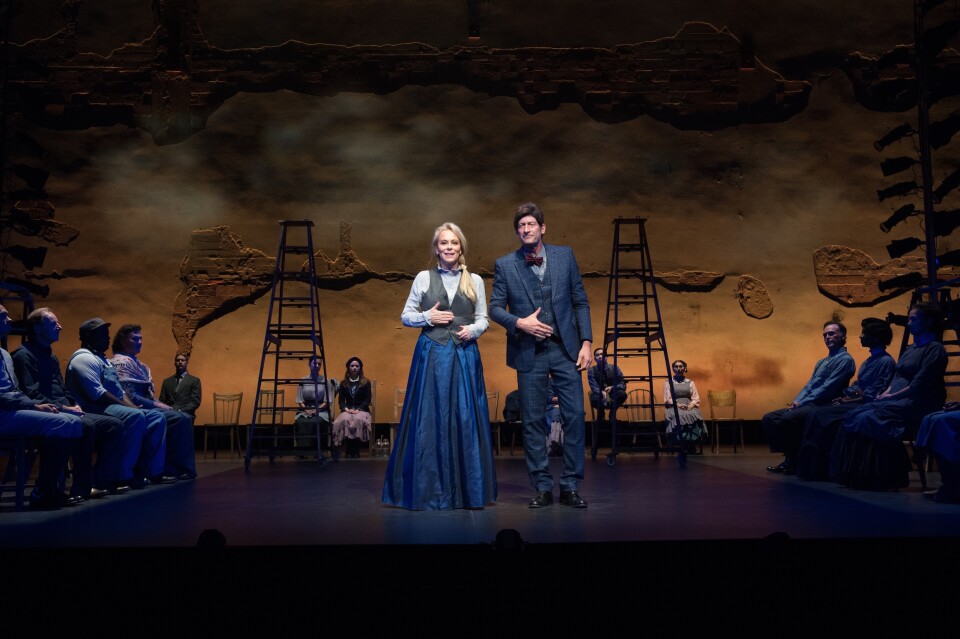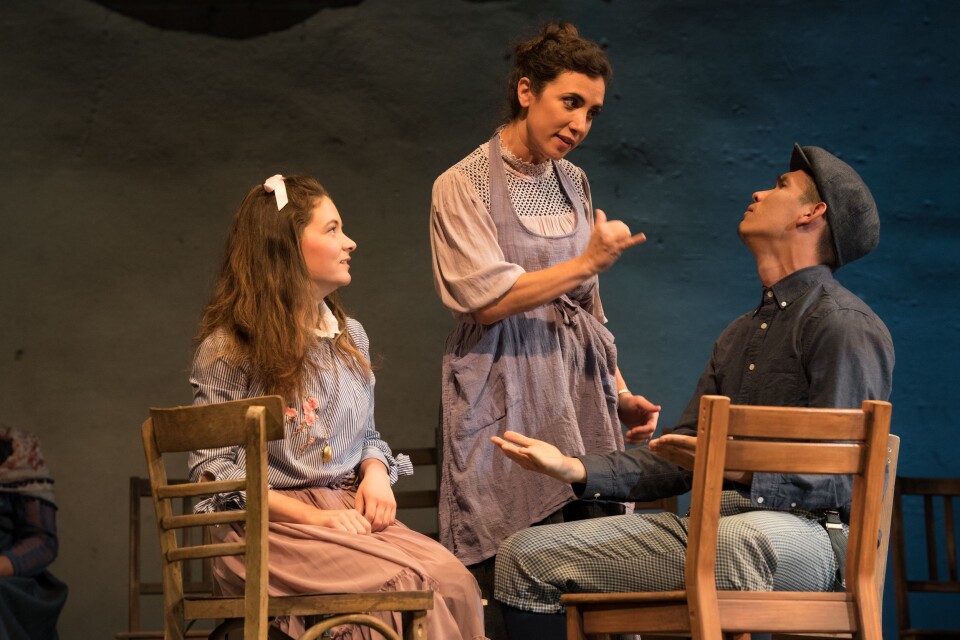Simmonds stars in the new film, "Wonderstruck" and Harvard is featured in the Deaf West Theatre production of "Our Town"; Netflix will spend $8 billion on content in 2018; low budget horror films like "Happy Death Day" are a bright spot for movie studios.
'Our Town' actor Russell Harvard says any play can be done in American Sign Language
Russell Harvard recently played the hitman Mr. Wrench in the FX series, "Fargo." The television star is also a veteran of the stage, now starring in a new production of "Our Town."
Harvard plays Mr. Webb and shares the role of the Stage Manager in Thornton Wilder's classic American drama, produced by Pasadena Playhouse and Deaf West Theatre, a company that performs simultaneously in American Sign Language and spoken English. Deaf West staged an adaptation of the musical "Spring Awakening" in 2015, which Harvard also performed in on Broadway.

Harvard was born deaf and has been acting since childhood. His feature film debut was as the adult version of Daniel Day-Lewis' son in Paul Thomas Anderson's "There Will Be Blood."
In the FX series "Fargo," a TV adaptation of the 1996 Coen brothers' film created by Noah Hawley, Harvard plays Mr. Wrench, one of two hitmen who pursues Lorne Malvo (Billy Bob Thornton) in season one. He resurfaces in the third season as a partner-in-crime to the protagonist Nikki Swango (Mary Elizabeth Winstead).

Russell Harvard was joined by an interpreter when he spoke with The Frame's John Horn at the Pasadena Playhouse. Below are some highlights from the conversation.
INTERVIEW HIGHLIGHTS:
Is there something about "Our Town" and "Spring Awakening" that are useful for a company like Deaf West to mount? Do they translate better than other plays might?
No, any play can be done in American Sign Language. There's no limitation, there's no barriers. But I do know there's some songs that are impossible to translate like, for example, Tori Amos, the singer. What the ****? I mean, how the hell are you going to translate her music, right? It's, like, out there.
If we were to watch your rehearsal process, what would we notice that is different in terms of how you know you're doing good work and how other actors who might be hearing can speak to you?
Laughter's important. That means we're doing our job, when we see the laughter and we see each other laugh. And I think actors, we listen with our eyes. Most of the actors are reliant on their sound. They forget to look with their eyes. And lately we've been doing that more. We're becoming more aware.

When you were growing up, was there a performance or a play you saw that made acting something you wanted to do?
When I was a kid, I watched my cousin in "The Wizard of Oz" as the witch. I said, I want to be her. I want to be the witch. We had to create our own Christmas performances so we created this play, and I said, I want to be the witch. They said, You can't be a witch. You're a boy. I'm like, I can be a male witch! So it happened.
I remember my dad saw the show and he said, Why are you a girl? I said, Because I wanted to. Playing the villain, I've been passionate about that. So when I received Mr. Wrench in "Fargo," it was a dream come true.
I want to ask about something that you said not that long ago: We need writers and casting directors to be fearless in working with actors who happen to be deaf. I'm a little bit exhausted to be called in a category of deaf performers. Do hearing actors have a category of their own apart from A-list, B-list, D-list?
That's exactly right ... I'm an actor. Not an actor who happens to be hearing or an actor who happens to be deaf. And that's why I'm keeping the writer of "Fargo," Noah Hawley, I'm keeping him close because he's my ally. We need more allies. Unfortunately, we live in this world where they're always labeling us — deaf or ethnic.

Just as there are wheelchair ramps in theaters, are there ways in which non-hearing audiences can enjoy everything that hearing people can?
We see slight baby steps. I can go to any movie at anytime I want now. I just saw "It" twice with captioning. Oh, it was amazing. I want to go for a third time. I'm not left behind anymore. I laugh at the same time with the audience. I appreciate more when we have the technology and be able to read throughout the show. I remember watching "Wicked" for the third time with eye caption. I was blown away. I couldn't believe it. I didn't laugh after the audience — I laughed with the audience. It was simultaneous and so it was amazing.
To hear John Horn's full interview with Russell Harvard, click on the player above.
How a deaf girl with no acting experience ended up as the star in ‘Wonderstruck’
Before Millicent Simmonds was cast in the upcoming Todd Haynes movie, "Wonderstruck," she had no ambitions to be an actress.
The only performing she'd done was in school productions back home in Utah. But the filmmaker was determined to find a young deaf girl to play Rose, who is also deaf, in his adaptation of the Brian Selznick book — and Simmonds won the part.
The Frame met Millie at the Telluride Film Festival where "Wonderstruck" made its North American premiere. She and interpreter Lynnette Taylor joined us for a conversation on the lawn outside The Frame's condo.
You can watch that conversation in the above video. Or you can hear an edited version that ran on our podcast by clicking the play button at the top of this page. Some highlights are below.
HIGHLIGHTS:
On communicating with the cast and crew on the set of "Wonderstruck":
There were several deaf actors in the film besides me. And a lot of extras also who were deaf. We communicated using an interpreter. Lynnette is one of the interpreters on set. She worked with me and Todd [Haynes] and she is amazing.
On learning that Brian Selznick, author of "Wonderstruck," isn't deaf:
I'd read the book before I auditioned — I think I was in fourth grade when I read the book — and I fell in love with it. I just loved the illustrations. I loved the story. I loved the pictures. And it was a different way of telling a story that I thought was really cool. And I first I thought, You know, the writer has to be deaf. They couldn't possibly understand the life of a deaf person. And I started to research him and I found out that he wasn't deaf and I was so surprised. I read the intro to his book and he talked about his research that he had done. He has a lot of deaf friends, he met with a lot of deaf people and really did his background research. And he really found it.
On what she hopes people learn about deaf people from the film "Wonderstruck":
There are a lot of hearing parents that have deaf children and they can't communicate — even today. There's still a belief that children should not learn sign language and that if they learn to lip read and speak that they'll be able to become more like hearing people, more assimilated. And I see many of my friends who can't communicate with their parents and I see their frustrations, their sadness. I have a lot of friends like that in school. So I hope what this movie shows is that parents should learn sign language. And if you have deaf children you should learn sign language so you can communicate with your children. You can still always treat them to lip read and always teach them alternative methods of communication, but start with sign language. That's their natural language. That's every deaf child's natural language. And it's okay to be different.
For more content like this, get The Frame podcast.





